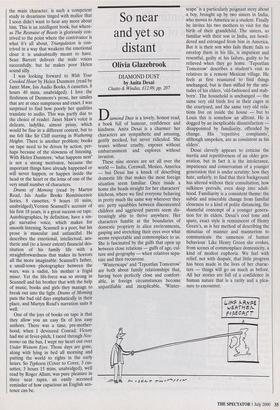So near and yet so distant
Olivia Glazebrook
DIAMOND DUST by Anita Desai
Chatto & Windus, f12.99, pp. 207 Diamond Dust is a lovely, honest read, a book full of humour, confidence and kindness. Anita Desai is a charmer: her characters are sympathetic and amusing, gently mocked, but never ridiculed. She teases without cruelty, exposes without embarrassment and explores without invasion.
These nine stories are set all over the world — India, Cornwall, Mexico, America — but Desai has a knack of describing domestic life that makes the most foreign situation seem familiar. Once inside a home she heads straight for her characters' kitchens, where we find everyone behaving in pretty much the same way wherever they are: petty squabbles between discontented children and aggrieved parents seem dis- tressingly able to thrive anywhere. Her characters fumble at the boundaries of domestic propriety in alien environments, gasping and stretching their eyes over what seems respectable and commonplace to us. She is fascinated by the gulfs that open up between close relations — gulfs of age, cul- ture and geography — when relatives sepa- rate and then reconvene.
Winterscape' and `Teportlan Tomorrow' are both about family relationships that, having been perfectly close and comfort- able, in foreign circumstances become unjustifiable and inexplicable. 'Winter- scape' is a particularly poignant story about a boy, brought up by two sisters in India, who moves to America as a student. Finally he invites his two mothers to visit for the birth of their grandchild. The sisters, so familiar with their son in India, are bewil- dered and estranged from him in America. But it is their son who fails them: fails to envelop them in his life, is impatient and resentful, guilty at his failure, guilty to be relieved when they go home. `Teportlan Tomorrow' describes a student's visit to relatives in a remote Mexican village. He feels at first reassured to find things unchanged, but is then stifled by the atti- tudes of his elders, 'old-fashioned and stub- born'. The household is unchanged — the same very old birds live in their cages in the courtyard, and the same very old rela- tions live on inside the house — but to Louis this is somehow an affront. He is dogged by an inexplicable dissatisfaction disappointed by familiarity, offended by change. His 'repetitive complaints', although unspoken, are as consistent as his elders'.
Desai cleverly appears to criticise the inertia and repetitiveness of an older gen- eration, but in fact it is the intolerance, impatience and conservatism of a younger generation that is under scrutiny: how they hate, unfairly, to find that their background has altered without their consultation; how sulkiness prevails, even deep into adult- hood. Familiarity is a consistent theme: the subtle and miserable change from familial closeness to a kind of polite distancing, the shameful contempt of a younger genera- tion for its elders. Desai's cool tone and spare, exact style is reminiscent of Henry Green's, as is her method of describing the minutiae of manner and mannerism to communicate the sameness of human behaviour. Like Henry Green she evokes, from scenes of commonplace domesticity, a kind of modest euphoria. We feel with relief, not with despair, that little progress has been made in the lives of her charac- ters — things will go on much as before. All her stories are full of a confidence in human nature that is a rarity and a plea- sure to encounter.


























































 Previous page
Previous page